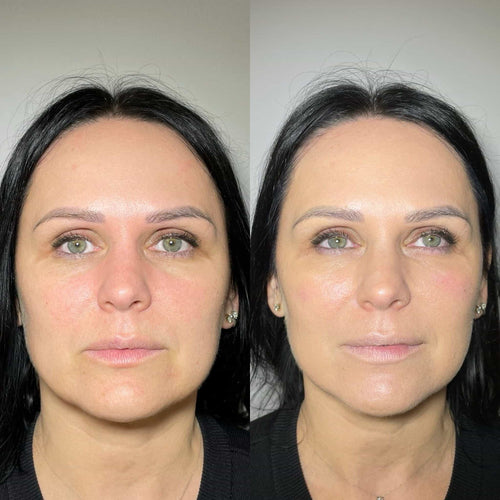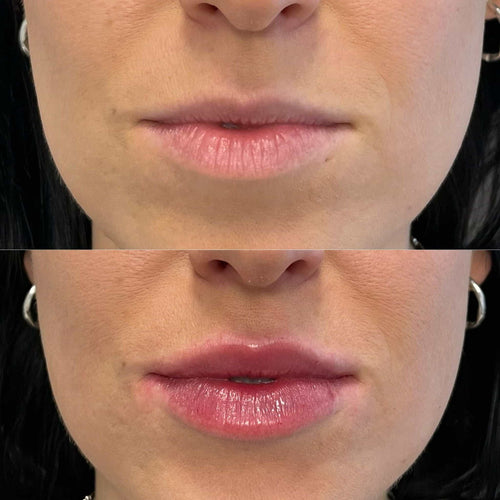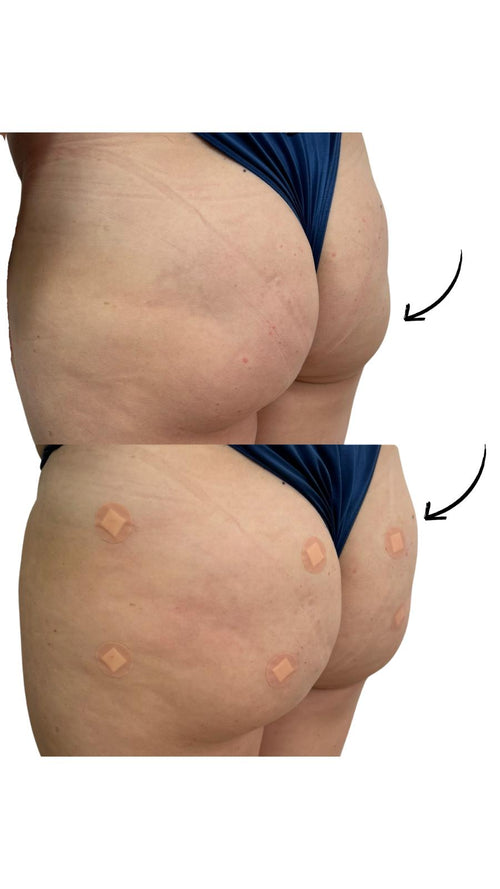Reserve Your Dermal Filler Appointment with Dr. Laura Geige Now
The Science Behind Swelling
Lip Filler Ingredients
Swelling is a natural part of the body’s healing process after any type of injection, including lip fillers. When a foreign substance is introduced into the tissue, the body responds with inflammation.
This inflammation triggers the release of inflammatory mediators, such as histamine and prostaglandins. These chemicals cause blood vessels to dilate, increasing blood flow to the area and leading to swelling.
Lip filler ingredients also contribute to swelling. Most lip fillers are hyaluronic acid (HA) based. HA is a naturally occurring substance in the body that helps retain moisture and plump up tissues.
When injected, HA draws water into the surrounding area, further contributing to swelling.

Other ingredients in lip fillers can also cause inflammation. Lidocaine, often added as a local anesthetic, can exacerbate swelling in some individuals.
The extent of swelling varies depending on factors such as the amount of filler injected, individual sensitivity, and injection technique.
Wearing lipstick soon after getting lip fillers can irritate the delicate tissue that is healing. Lipstick ingredients, especially those with fragrance or color pigments, can further trigger inflammation and potentially delay the healing process.
Impact of Hyaluronic Acid on Lip Tissue
Swelling after lip fillers is a common occurrence and a natural part of the healing process.
Here’s the science behind it:
- Injection Trauma: When filler is injected, it creates tiny punctures in the tissue. This trauma triggers an inflammatory response.
- Immune System Activation: The body recognizes the filler as a foreign substance and sends white blood cells to the area to fight it off. These immune cells release chemicals called cytokines, which promote inflammation.
- Fluid Accumulation: Inflammation causes blood vessels to dilate and become more permeable. This leads to fluid leakage into the surrounding tissues, resulting in swelling.
Hyaluronic acid (HA) is a naturally occurring substance found in the body that plays a crucial role in maintaining skin hydration and volume.
Here’s how it impacts lip tissue after fillers:
- Volume Enhancement: HA fillers are composed of cross-linked hyaluronic acid molecules that attract and retain water. This increases the volume and fullness of the lips.
- Hydration Boost:** HA’s inherent ability to hold moisture helps keep lip tissue hydrated, which can contribute to a smoother and more plump appearance.
- Scaffolding Effect: HA fillers can act as a scaffold for new collagen production, further enhancing the long-term volume and structure of the lips.
The swelling associated with lip fillers typically peaks within 24-72 hours after the procedure and gradually subsides over the following days or weeks.
During this time, applying cold compresses can help minimize inflammation and discomfort. It’s best to avoid wearing lipstick immediately after filler injections as it can irritate the delicate treated tissues and potentially impede healing.
The Lipstick Conundrum: Why It Doesn’t Mix Well
Friction and Irritation
The “Lipstick Conundrum” stems from a combination of factors that arise after lip fillers are injected.
One primary reason lies in the **inflammation** and swelling that follows filler placement. The injection process disrupts the delicate tissue, triggering a natural inflammatory response. This inflammation causes the lips to swell and become more sensitive.
The added volume from the fillers also alters the lip’s natural contours and texture. The surface becomes smoother and less textured, creating a barrier that makes it harder for lipstick pigments to adhere properly.
Furthermore, **friction** plays a significant role. When you apply lipstick to swollen and sensitive lips, the act of rubbing and gliding can exacerbate irritation and discomfort.
Lipstick itself can contain ingredients that further contribute to this problem. Dyes, pigments, fragrances, and preservatives** can all trigger allergic reactions or irritate already compromised skin.
This combination of factors ultimately leads to the “conundrum”: lipstick doesn’t glide on smoothly, it may appear patchy or uneven, and it can cause unnecessary irritation and discomfort.
Increased Risk of Infection
Applying lipstick after lip fillers can be tricky due to a combination of factors that primarily revolve around ingredient incompatibility and potential risks.
Here’s a breakdown of why lipstick doesn’t mix well with lip fillers and the increased risk of infection:
- Ingredient Conflict: Lip fillers, often composed of hyaluronic acid (HA), attract and hold water. Certain lipstick ingredients, particularly oil-based products or those containing alcohol or fragrances, can disrupt the filler’s structure and cause it to break down.
- Increased Risk of Infection: The lips are delicate areas with a high concentration of blood vessels. Lip fillers introduce foreign substances into this sensitive tissue, temporarily compromising its barrier function. Applying lipstick after fillers increases the risk of introducing bacteria or other pathogens into these vulnerable sites, potentially leading to infection.
- Color Bleeding and Distortion: Oil-based lipsticks can bleed into the filler, creating an uneven or distorted appearance. The pigments in some lipsticks may also react with the HA, causing discoloration or fading of the filler.
To minimize risks, it’s best to avoid applying lipstick immediately after lip fillers. Consult your injector for specific recommendations regarding makeup application after your procedure. They can advise on safe and compatible products for use during the healing phase.
Bridging the Gap: Solutions for Post-Filler Lipstick Lovers
Expert Recommendations
After undergoing lip fillers, many people find themselves struggling to apply lipstick smoothly and evenly. This frustration stems from the altered texture and volume of the lips, which can make traditional lipstick application tricky.
The key issue lies in the fillers’ composition. They often contain hyaluronic acid, a gel-like substance that attracts and holds water. This hydration plumps the lips beautifully but also creates a slightly slick surface, making it difficult for pigment to adhere properly. Lipstick can either slide off easily or cling unevenly, leaving behind a patchy or blurred appearance.
However, don’t despair! There are several strategies and product recommendations that can help you bridge the gap and achieve flawless lipstick application post-fillers:
**1. Prep Your Lips:**
The first step is creating a smooth canvas for your lipstick. Exfoliate gently with a lip scrub or soft toothbrush to remove any dry skin cells. This allows the lipstick to glide on more easily.
**2. Hydrate & Prime:**
After exfoliating, apply a hydrating lip balm and allow it to fully absorb. Follow up with a lip primer designed for long-wear lipstick. Primers create a barrier that helps lipstick adhere better to the smooth surface of your lips.
**3. Choose the Right Lipstick Formula:**
Opt for lipsticks that are known for their staying power and adhesion. Matte formulas tend to perform best as they don’t have the same slickness as creamy or glossy finishes. Look for hydrating matte lipsticks with hyaluronic acid or nourishing oils to avoid dryness.
**4. Application Techniques:**
Reserve Your Dermal Filler Appointment with Dr. Laura Geige Now
Start by applying lipstick in small, precise dots along the lip line. Then, gently blend it outwards towards the center of your lips using a lip brush or your fingertip. This technique ensures even coverage and minimizes the risk of feathering or bleeding.
**5. Setting Powder:**
For extra staying power, set your lipstick with a translucent powder using a fluffy brush. This helps absorb any excess moisture and prevents smudging.
Remember that it might take some experimentation to find the perfect combination of products and techniques that work for you. Don’t be afraid to try different things until you achieve the desired results.
Safe Alternatives
Bridging the gap between plumped lips and lipstick application can be frustrating for those who love the look of lip fillers but also enjoy the color and shine of lipstick. The main culprit behind this dilemma? Swelling and sensitivity after filler treatment.
Here’s a breakdown of why wearing lipstick post-filler can be tricky, along with solutions to help you achieve your desired look:
**Understanding the Issue:**
-
Swelling: Lip fillers, especially hyaluronic acid-based ones, cause initial swelling which lasts for a few days. Lipstick can exacerbate this, making lips appear even more swollen and potentially leading to discomfort.
-
Sensitivity:**
Your lips are more sensitive after filler treatment, prone to irritation, dryness, and potential allergic reactions. Certain lipstick ingredients like fragrances, dyes, or preservatives can aggravate these sensitivities.
-
Texture:**
Lipstick often has a thick texture that can feel heavy and uncomfortable on freshly filled lips, further exacerbating the sensitivity issue.
**Solutions for Lipstick Lovers:**
-
Timing is Key: Wait at least 24-48 hours after your filler appointment before applying lipstick. This allows the initial swelling to subside and for your lips to start feeling more comfortable.
-
**Choose Gentle Lipsticks:** Opt for hydrating, fragrance-free, dye-free, and non-comedogenic (won’t clog pores) lipsticks. Look for products with natural ingredients like shea butter or beeswax that provide nourishment.
-
Go Sheer: Start with sheer or tinted lip balms to avoid irritation. Gradually transition to fuller coverage as your lips heal.
-
**Exfoliate Gently:** Before applying lipstick, lightly exfoliate your lips with a soft toothbrush or sugar scrub. This removes any dryness and allows for smoother lipstick application.
-
Lip Primer: A lip primer can help create a smooth base for lipstick, preventing feathering and helping it last longer. Choose one that’s hydrating and not overly drying.
-
**Hydration is Essential: Keep your lips hydrated throughout the day with a nourishing lip balm.
-
Consult Your Provider: If you experience persistent irritation or sensitivity, consult your aesthetic provider for advice on suitable lipstick options.
Book a Dermal Filler Consultation at It’s Me and You Clinic with Dr. Laura Geige
Remember, patience is key when it comes to wearing lipstick after lip fillers. Allow your lips to heal properly and gradually introduce color while prioritizing their comfort and well-being.
Making Memories London Alkhemist LA Pinnacle Wellbeing Media Elizabeth Rohrbaugh Ring of the Reeks Cycle



















